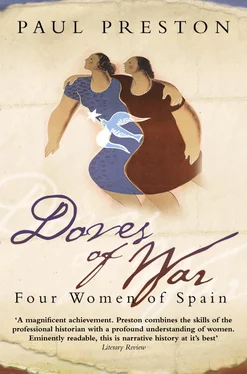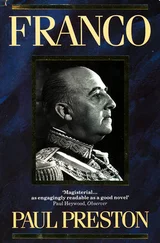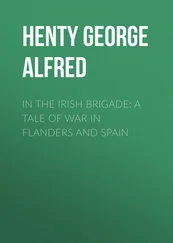1 ...8 9 10 12 13 14 ...27 After a perilous journey on mountain roads, Pip and Consuelo reached the bombed-out village of Cella. Their welcome was muted since there was neither food nor accommodation to spare. The officers refused to believe them when they said they would willingly sleep on the bare floor. They were eventually put in a room with three others, without proper bedding or window panes and only the most minimal sanitation. Pip’s spirit of adventure and her country background helped her make light of the situation: ‘The town itself is crammed with soldiers and mules, and ambulances come and go in a continuous stream. I am so enchanted with the place that I long to stay but we are terribly afraid that they will send us back when the others come as they have precedence over us. It is a shame as they will hate the discomfort and dirt and all and we don’t mind it.’ Indeed, she was anxious to join a mobile unit leaving for a position at Villaquemada, even nearer to the front line. Just when Pip thought that she would have to go back to Alhama, a need arose for two nurses so she and Consuelo were able to stay. They also found accommodation in a peasant farmhouse. Possessing a car made a colossal difference, since she could drive to nearby towns to shop for household necessities to make their room more comfortable and also for food. In the operating theatre itself, Pip was shocked by the doctor’s ignorance of basic procedures of hygiene, ‘His ideas of antisepsia were very shaky and it gave me the creeps to see the casual way they picked up sterilised compresses with their fingers.’ She was equally alarmed to see their peasant hostess dipping into their food fingers ‘black with years of grime’. 69
The Nationalists were mounting a major attack on Republican lines at Teruel and Pip’s medical unit was moved nearer the front. On 5 February, she was in attendance for ‘one elbow shrapnel wound, three amputations, two arms and one leg, two stomach wounds, one head and one man who had shrapnel wounds in both legs, groin, stomach, arm and head. They were vile operations. The stomach ones were foul. One had to be cut right down the middle and his stomach came out like a balloon and most of his intestines; the other had a perforated intestine so had all his guts out, looking revolting.’ Things were made more difficult by the fact that the doctor for whom she worked was both incompetent and perpetually irritable. ‘It is perfectly grim having to work as operation sister to a man one does not trust, who is brutal and shouts at one all the time. It is nerve-wracking and leaves me all of a flop.’ Pip discovered that she had type O blood and therefore could give blood for transfusions. At massive cost to both sides, the battle swayed back and forth until finally, on 7 February 1938, the Nationalists broke through and the Republic lost a huge swathe of territory and several thousand prisoners as well as tons of valuable equipment. Pip was delighted: ‘The news of the war last night was stupendous. We have advanced to Alfambra, twenty kilometres in two days, taking fifteen villages, 2,5000 prisoners and 3,000 dead, not to mention lots of war material.’ It was the beginning of an inexorable advance which in two weeks would lead to the recapture of Teruel on 22 February, the capture of nearly fifteen thousand prisoners and the loss of more equipment. 70
The appalling conditions in the operating theatre could be mitigated by the trips in the car. Only with considerable resourcefulness had she kept it on the road, changing wheels, repairing punctures and getting it started in sub-zero temperatures. She drove to Alhama to collect her belongings which had been sent there from Aranda. Having a gramophone and lots of new records sent out by her family made life all the more tolerable. She also was able to see some beautiful countryside. Buying presents for the family with which she was billeted, she was surprised at their reaction – ‘Unlike English poor class they were so proud they would hardly accept them.’ The gruesome sights that she was seeing each day in the operating theatre were so distressing that she needed every possible distraction. Her diary faithfully recorded the details of horrendous surgical interventions often carried out without anaesthetic. After an operation on a young boy wounded in the stomach only three days after being conscripted, she broke down and cried. ‘He was so white and pathetic with an expression of such pain and sorrow and he never made a sound.’ The accumulated horrors were beginning to get to her and she began to question the wisdom of coming to Spain. However, by the following day she had recovered her usual good spirits. A lunch which would have been the envy of the entire Republican zone helped. It consisted of ‘poached eggs, tinned salmon with mayonnaise, albóndigas (meatballs in rich gravy) and fried potatoes, cheese and chocolate pudding, not to mention foie gras and oporto as an aperitif and coffee and coñac to finish with’. Even better was an unexpected – and poignantly short – visit from Touffles. Despite the cold, in a room with no panes in the windows, having to sleep fully dressed in tweeds, she sewed and ironed and maintained her essential cheerfulness. Inevitably she faced many of the same problems as Nan Green and the front-line nurses on the Republican side. ‘The thought of a hot bath, a comfortable bed, a good meal that we did not have to cook ourselves or watch cooking and a w.c. instead of a pot seemed distinctly pleasant.’ 71
On 17 February, there was a big Nationalist push and Pip went to watch the battle from a German anti-aircraft battery. ‘The noise was incredible, a continual roar like thunder with intermittent different-toned bands. The sky was full of aeroplanes shooting up and down the Red trenches and the whole landscape all around was covered with pillars of smoke.’ ‘At about 11.30 the bombers began to arrive and came in a continual stream for hour after hour till the Red lines were black with the smoke of the bombs.’ Pip thought it was ‘the most thrilling thing I have ever seen’. The counterpart to the exhilarating sights was an increase in traffic in the operating theatre. Her compassion for the wounded and dying was unrelated to any analysis of the reasons for the war. Indeed, by 20 February, she was exhilarated by the possibility of going to see Nationalist troops entering Teruel. Although not allowed to enter the city, she and her fellow nurses found a vantage point from which, ‘to our great joy’, they watched Nationalist aircraft bombing the Republicans retreating towards Valencia.
Yet on the next day, after ten hours’ non-stop effort in the operating theatre, she could write that ‘it is demoralising to live in an eternal whorl of blood, pain and death’. Reflecting on the daily deaths of casualties in the operating room, she wrote: ‘I don’t know how there is anyone left.’ There was still house-to-house fighting in Teruel. On 22 February, awakened by bells ringing for the Nationalist capture of the city, she walked through the battered remains of the city. ‘I didn’t see a single whole house, they are all covered in bullet holes and shot to bits by cannons with great gaping holes from air bombardments.’ In the midst of the rubble, she found an undamaged grand piano in a bar and played tunes while the soldiers stopped looting in order to dance. She rejoiced at the Nationalist advance that was chasing the retreating Republicans to the south. Three thousand prisoners were taken and two thousand dead according to the official radio. The next day, back in the hospital, she was covered in blood from the operations and, on the day after that, back in Teruel. She was flushed with excitement by a Republican artillery bombardment – ‘I admit I was terrified myself but I like being frightened.’ Her emotional highs and lows were intense. 72
Читать дальше












